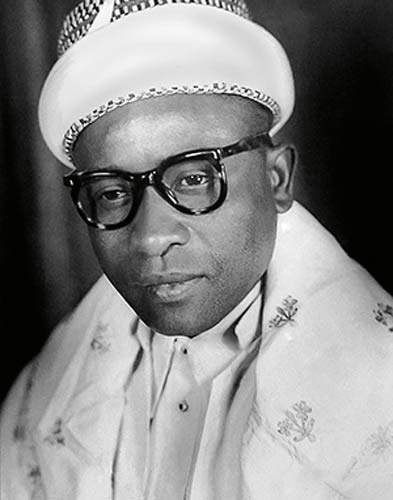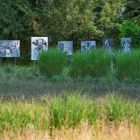Mama Casset
“African Photo Studio”
A head resting casually on interwoven hands, an imposing hairstyle fashioned from fabric and expertly braided hair, a delicate wrist movement, sumptuous clothes, the individuality of a childish face: the Senegalese photographer Mama Casset excelled in capturing these poses – so simple and yet so difficult to grasp. A pioneer in his art in his native country, the portrait photographer began his career after having worked at the Comptoir Photographique de l’Afrique Occidentale Française, a photographic store, and for the French Air Force, for whom he took aerial photos for nearly 20 years. Mama Casset’s story encompasses the two great wars of the twentieth century. It wasn’t until after the Second World War that he opened his studio, African Photo, in the very heart of the Dakar Medina.
At a time when the African middle class was burgeoning, studio portrait photography, introduced early in the century in Europe, became extremely popular. Mama Casset was a key figure in this trend, especially after foreign photographers left Senegal when it became independent in 1960.
But he did not only own Dakar’s most fashionable studio. He produced work, which he described as artistic with a very personal aesthetic, which would inspire future generations of photographers: few decorative elements, a highly-structured arrangement of his subjects, frequent use of oblique angles and diagonals and a tight framing which captures with finesse the complex personalities of his subjects. To look at a Mama Casset photo is to sense the heady perfumes of African incense, a suppressed laugh or a hidden sadness, the strengths and the weaknesses of the person posing in front of you.
Roland Barthes used to say that a photographic portrait is a force-field where four fantasies collide. In front of the lens, there is the person that I think I am, the person I would like to be, the person that I am in the eye of the photographer and the person through whom he expresses his art. Who are these men and women that we see in these old-fashioned images, all dressed up in their finest clothes, we ask ourselves, and who did they want to be? And above all: whoever looks at these subjects seems to be able to see them better than anyone.
INFO POINT
Tourist Information Baden
Brusattiplatz 3, 2500 Baden bei Wien
Open during the photo festival:
Monday – Friday: 10.00 – 16.00 hrs
Saturday: 13.00 – 17.00 hrs (June – August)
Saturday: 13.30 – 16.00 hrs (September – October)
Closed on Sundays and public holidays!
Tel: +43 (0) 2252 86800 600
info@baden.at
Festivalbüro La Gacilly-Baden Photo
Tel: +43 (0) 2252 42269
festival@lagacilly-baden.photo


